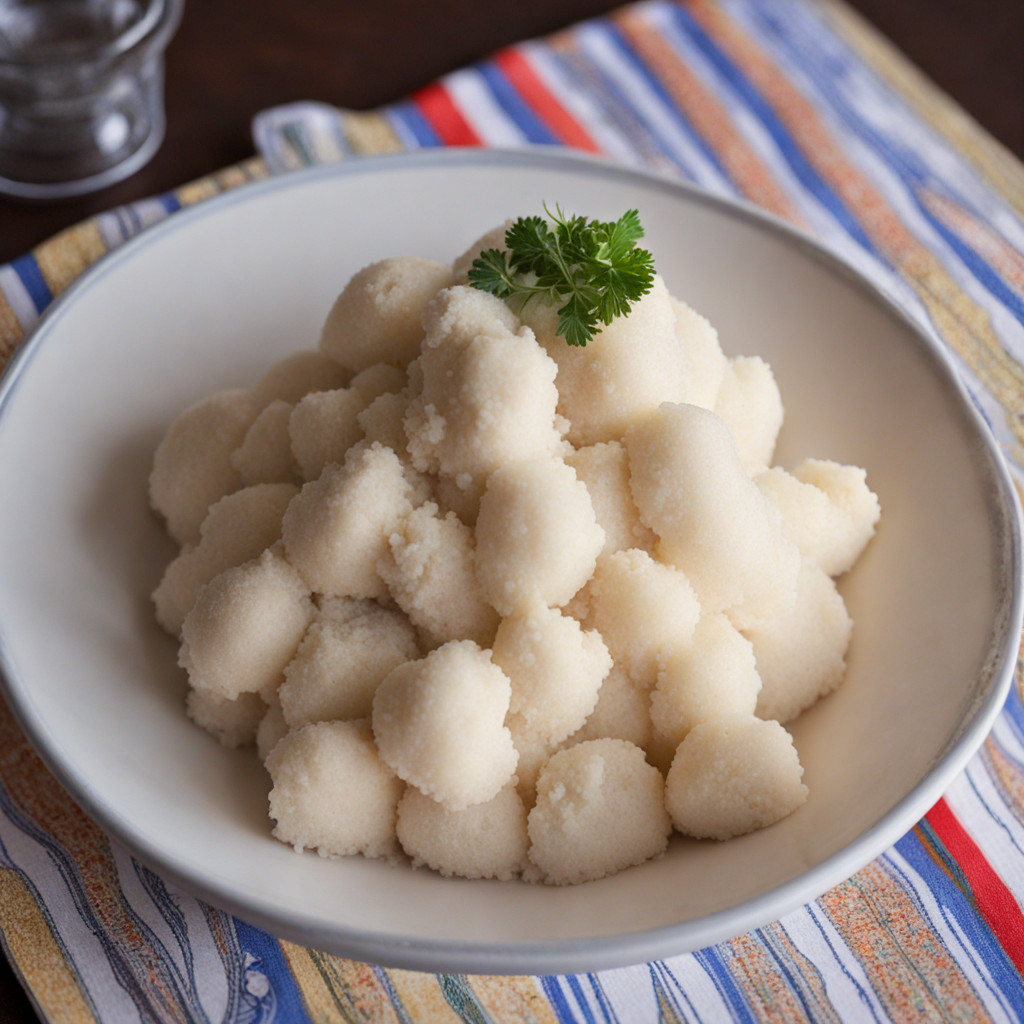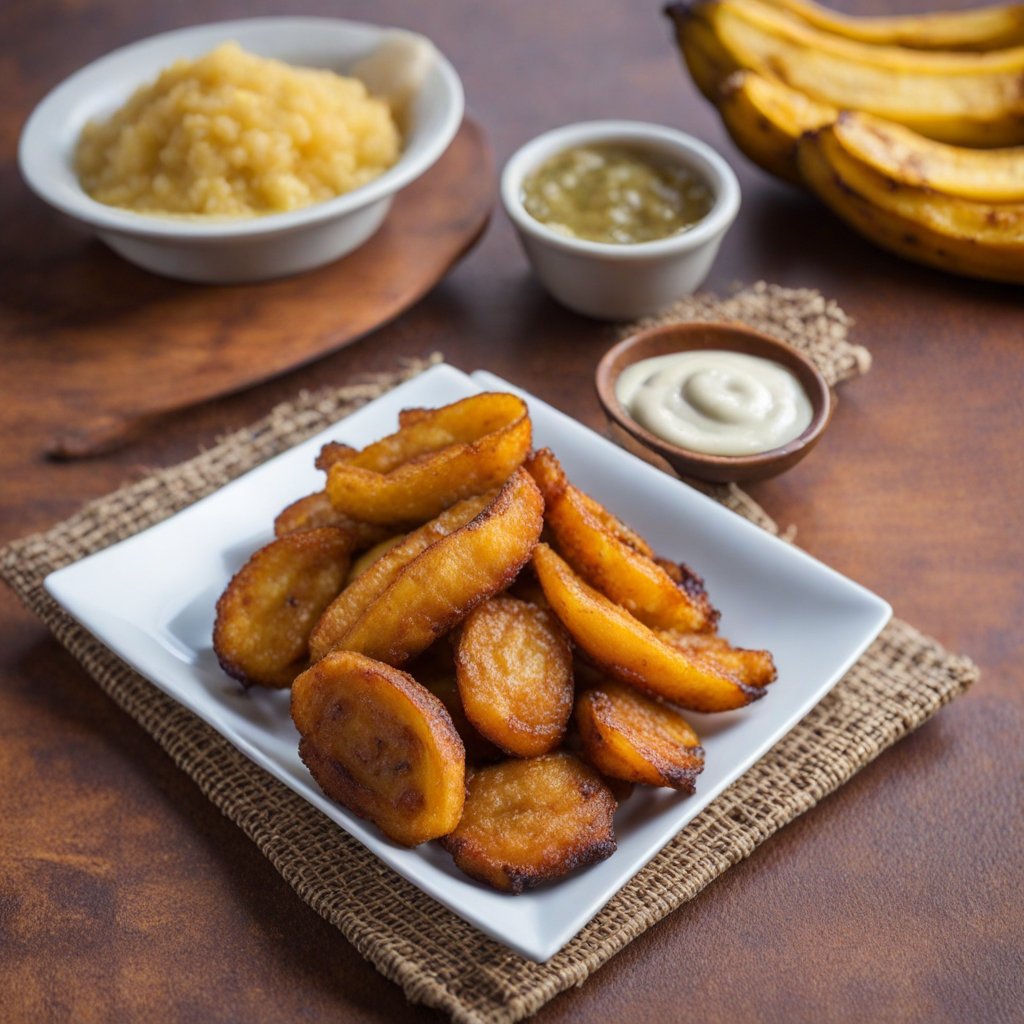Ubugali
Ubugali is a staple food in Rwanda, revered for its simplicity and versatility. This traditional dish is made primarily from finely ground maize flour, which is cooked with water to create a thick, dough-like consistency. The process involves stirring the mixture continuously to avoid lumps, resulting in a smooth, dense texture. Ubugali is often served as a side dish, complementing a variety of savory stews, grilled meats, or vegetables, making it a perfect canvas for other flavors. Its mild taste allows it to absorb the rich flavors of the accompanying dishes, enhancing the overall dining experience. In Rwandan culture, Ubugali is not just food; it represents togetherness and community. Traditionally, it is served in a communal setting, where families and friends gather to share a meal. It is typically shaped into round balls that can be easily dipped into stews or sauces, encouraging a hands-on eating experience. This aspect of sharing food fosters strong social bonds and reflects the importance of communal dining in Rwandan society. While Ubugali is most commonly made with maize flour, variations can include the use of cassava or sorghum flour, each bringing a unique texture and flavor profile. The dish can also be enhanced with the addition of spices or herbs, catering to different palates. For those looking to explore new tastes, Ubugali offers a delightful introduction to Rwandan cuisine, showcasing the balance of simplicity and depth that characterizes many traditional African foods.
How It Became This Dish
Ubugali: The Soul of Rwandan Cuisine Ubugali, a staple food in Rwanda, is a simple yet significant dish made from maize flour (or cassava flour) and water, cooked to a thick, dough-like consistency. It is often served as a side dish with various stews, vegetables, and meats, embodying the richness of Rwandan culinary traditions and the resilience of its people. The history of ubugali is not just about nutrition; it is interwoven with the cultural, social, and economic fabric of Rwanda, reflecting the nation’s identity and its evolution over time. #### Origins of Ubugali The roots of ubugali can be traced back to the early agricultural societies of East Africa, where agriculture and the domestication of grains became essential for sustenance. The Bantu-speaking peoples, who migrated into the region over a thousand years ago, brought with them knowledge of agriculture and cooking techniques. Millet and sorghum were among the first grains cultivated, but as maize was introduced to Africa from the Americas in the 16th century, it quickly became a favored staple due to its high yield and versatility. In Rwanda, maize flour became the primary ingredient for ubugali. The dish itself is thought to have evolved from similar staple foods found across the region, such as ugali in Kenya and posho in Uganda, showcasing the interconnectedness of East African culinary traditions. Ubugali's preparation is straightforward, requiring the flour to be mixed with boiling water and stirred until it reaches a thick, cohesive texture. The simplicity of its ingredients reflects the agricultural practices of rural communities, where farming is a way of life. #### Cultural Significance Ubugali holds a profound cultural significance in Rwandan society. It is more than just a meal; it is a symbol of unity, hospitality, and the spirit of sharing. In many Rwandan households, meals are communal, and ubugali is often served at the center of the table, inviting family and friends to gather around. The act of sharing food is deeply embedded in Rwandan culture, fostering connections and reinforcing social bonds. The dish is traditionally eaten with the hands, a practice that emphasizes togetherness and the enjoyment of food as a communal experience. Ubugali is typically accompanied by a variety of side dishes, such as isombe (cassava leaves), ibihaza (pumpkin), or a stew of meat, beans, or vegetables. These accompaniments not only enhance the flavor profile but also reflect the agricultural diversity of Rwanda, where different regions produce unique crops. In Rwandan culture, food is often used to mark significant life events, such as weddings, funerals, and community gatherings. Ubugali serves as a centerpiece in these celebrations, symbolizing abundance and shared joy. The dish's presence at important occasions underscores its role as a cultural marker and a means of expressing identity. #### Development Over Time Historically, Rwanda has faced numerous challenges, including colonial rule, ethnic tensions, and the devastating genocide of 1994. Each of these events has shaped the culinary landscape of the nation, including the evolution of ubugali. During the colonial period, the introduction of cash crops altered agricultural practices and food availability, leading to changes in dietary habits. However, traditional foods like ubugali remained resilient, adapting to the changing circumstances while retaining their cultural significance. Post-genocide, Rwanda underwent a period of rebuilding and reconciliation, and food played a vital role in this process. Ubugali emerged as a symbol of resilience and national identity, reminding the people of their cultural heritage and the importance of community. The dish became a way to reconnect with traditions and foster unity among a population that had experienced profound trauma. In contemporary Rwanda, ubugali continues to be a staple in both rural and urban areas. While its basic preparation remains unchanged, the dish's presentation has evolved. In urban settings, ubugali is often served in restaurants and is paired with a wider variety of international cuisines. This adaptation reflects Rwanda's growing tourism industry and a burgeoning interest in its culinary heritage. Moreover, the Rwandan government has recognized the importance of food in promoting national identity and heritage. Initiatives aimed at preserving traditional cooking methods and promoting local agriculture help sustain the production of ingredients like maize and cassava, ensuring that ubugali remains a vital part of the nation’s cuisine. #### Ubugali in Modern Context In the modern culinary landscape of Rwanda, ubugali has found new expressions. Chefs and home cooks alike experiment with flavors and presentations, incorporating global influences while remaining grounded in tradition. For instance, variations of ubugali made with different grains or served with diverse sauces reflect the evolving tastes of a younger generation. In addition to its role in traditional meals, ubugali is increasingly featured in culinary festivals and events that celebrate Rwandan culture. These gatherings provide an opportunity to showcase the dish alongside other traditional foods, illustrating the richness of Rwandan gastronomy. The promotion of ubugali as part of Rwandan heritage contributes to a broader understanding of the nation’s culinary identity, both locally and internationally. #### Conclusion Ubugali is more than just a dish; it is a testament to the resilience and richness of Rwandan culture. Its origins, rooted in agricultural practices, connect the past to the present, while its cultural significance fosters unity and community. As Rwanda continues to grow and develop, ubugali remains a cherished symbol of national identity, embodying the spirit of hospitality and the enduring strength of its people. Through this humble yet profound dish, one can appreciate the deep historical and cultural narratives that shape Rwanda’s culinary landscape, reflecting a society that values its traditions even as it embraces the future.
You may like
Discover local flavors from Rwanda







